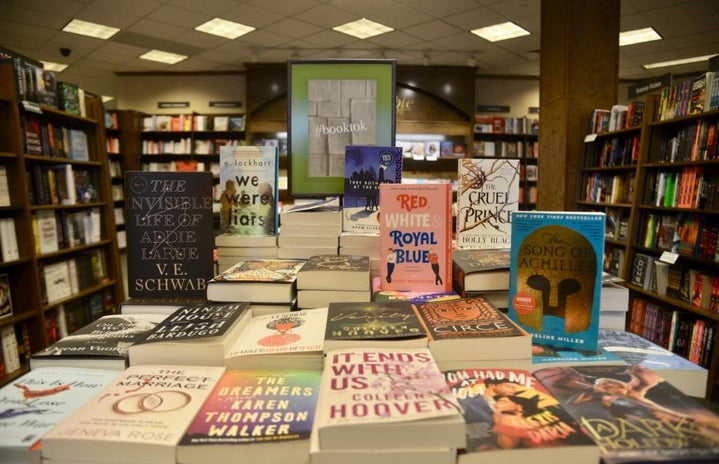In 2020, for the first time, our modern-age society came to a halt. We were all stuck inside, working from home, having zoom lectures with our teachers, and…. downloading TikTok. To
escape the realities of the outside world of politics and pandemics, we picked up TikTok and could not put it down.
With the ever-evolving world of TikTok’s algorithm and the varying “For You” pages fitted specifically to each user, a trend that has recently become public interest is “#BookTok.” A sub-genre of content within the app is full of videos and content creators dedicated to recommending, reviewing, and buying books.
I have to admit, I was one of the millions who downloaded TikTok while I was stuck indoors, and until deleting it as a part of a new year’s resolution, I was addicted to it. I would even consider myself to have first-hand experience and fallen victim to the culture of “BookTok.”
Prior to the pandemic, I was not much of a reader. I was at school for eight hours, five days a week, and by the time I got home, I either had more homework or was too tired to do anything, let alone read. But when the pandemic started, I suddenly had an extreme amount of free time. I tried painting, baking, jewelry making, and finally, reading stuck.
For the first time since my Scholastic book fair days, I willingly picked up a book– and I would like to thank “BookTok” for that. With various video recommendations on my “For You” page (and with a five-year-old $50 gift card to Barnes and Noble), I decided to pick up some “BookTok” classics. Song of Achilles by Madeline Miller, The Seven Husbands of Evelyn Hugo by Taylor Jenkins Reid, and Death on the Nile by Agatha Christie.
And I was not alone in the revival of reading. Ever since “BookTok” blew up, reading, and subsequently the entire book and publishing industry, has faced a renaissance. In 2021, the publishing industry saw an almost 50% increase in sales since 2012, according to Words Rated.
Social media brings a factor to the industry that has never been seen before- providing everyday, regular readers a platform to promote books. Rather than the power of the sales coming from the publishers, authors, and stores themselves, “influences” within this genre of social media are creating sales.
Selene Velez, the creator behind @moongirlreads_ on TikTok and boasting over 200,000 followers and 20 million likes, has provided an insider look at the profitability “BookTok” has granted its readers and writer alike. In an interview with The New York Times, Velez revealed that publishers are willing to pay hefty amounts to take advantage of this invaluable sales tactic. She said that after having multiple videos go viral, publishers now send her books ahead of release, along with anywhere between hundreds or thousands of dollars, to promote the books on her page.
The impact of “BookTok” has also spread to physical bookstores. Walk into your local bookstore, and you will likely find sections dedicated to “#BookTok Recs.”
The CEO of Barnes and Noble told Insider that he has never seen anything like the explosion of popularity TikTok has had on the world of books in his decades of working in the industry.
And this does not sound like a bad thing… or does it?
What sparked my interest in dissecting this topic was a newly published article by GQ titled “In the shallow world of BookTok, being ‘a reader’ is more important than actually reading.”
(If you’re interested in a deeper dive into this topic, while I was writing this article, one of my favorite YouTubers, “The Book Leo,” published her own video essay critiquing this specific article by GQ, titled “is TikTok ruining reading? & the desire to be a reader”, and I highly recommend it.)
The romanticization of reading as a part of an aesthetic is becoming more of a topic of discussion. Barry Pierce writes in the GQ article, “But there was just something about watching… people openly confessing to owning hundreds of unread books… It was like entering a parallel universe where reading wasn’t just something that someone did for fun, it was a lifestyle, an aesthetic, people were ‘readers.’” Books, and their aesthetics, are becoming part of the micro-trends that dictate TikTok and other industries.
Reading being associated with aesthetics is not entirely new. For example, introduced in 2014 on Tumblr, “Dark Academia” draws inspiration from prep schools, literature, “writing, the arts, and classic Greek and Gothic architecture.”
You may be wondering, if this idealization of reading is not a new issue, then why is it now- with the facilitation of TikTok? TikTok’s fast-paced, endless scrolling video platform algorithm allows its user to fall into hyper-consumerism culture through the never-ending micro-trends and aesthetics.
While these critiques of TikTok, aesthetics, and reading are a bit negative, I also see a positive side to this narrative. I am hopeful that those first drawn into the world of reading and books solely for the aesthetic can utilize “BookTok” as a turning point to be their introduction to the wide world of literature, as I was myself.


